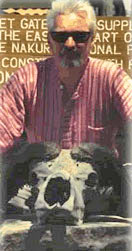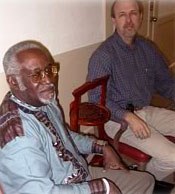Going Global with Research: Faculty Say International Missions are Invaluable
By: Jamie Creamer

Wes Wood
Wes Wood was just out of Colorado State University with a doctorate in soil science and settling into his job as the newest faculty member in Auburn's Department of Agronomy and Soils, when CoAg Associate Dean Richard Guthrie told him to go to Haiti.
Actually, it wasn't an order. Guthrie, then-head of the CoAg's Office of International Agriculture and long a proponent of global connections, was offering Wood the opportunity to participate in an international development project to control erosion on Haitian farmland.
For Wood, a novice assistant professor, that two-week Haiti mission was invaluable, driving home early on that international perspectives and experiences were vital to his career. In the years since that initial journey, Wood has returned to Haiti four times and also has traveled to countries including Kenya, Thailand, Mexico, Peru, Honduras, New Zealand and Russia to study nutrient cycling and the environmental aspects of agricultural production.

Curtis Jolly, left, and Greg Traxler.
"The work I've done overseas has had a tremendous impact on me professionally, both as a researcher and in the classroom," Wood says.
Other CoAg faculty who have "gone global" with their research echo Wood, saying that these international connections yield multiple dividends such as strengthening their research data, broadening their perspectives, enhancing their reputations in the scientific community, building AU's reputation as a first-class research university and attracting high-caliber foreign graduate students to Auburn. In essence, they link the citizens of Alabama to the people and institutions of countries the world over.
For Claude Boyd, a CoAg professor in fisheries and allied aquaculture, traveling the world has become part of his routine. His internationally recognized expertise in water quality management and environmentally sound aquaculture production has taken him to India, Thailand, Brazil, Ecuador, Madagascar, Malaysia and a dozen other countries to work with foreign aquacultural scientists and to identify, investigate and solve production issues and problems.
Boyd says his projects overseas, which can keep him out of the country for anywhere from one week to six months, have been a boon to aquaculture because they give him a global laboratory in which to study and experiment.
"Producers here (in the U.S.) operate on such a thin profit margin that they can't afford to give up even a few acres for on-farm research," Boyd says. But in Brazil, where commercial shrimp farming has flourished in recent years, large corporations that own thousands of acres in ponds are more than willing to set aside sizable areas for research.
"That gives us the opportunity to set up a lot of research projects that we otherwise wouldn't be able to," Boyd says. "And our research doesn't just help aquaculture in those countries; it's important to producers here, too."
Indeed, research abroad drives home the reality of an increasingly interdependent global economy, CoAg agricultural economics professor Greg Traxler says.
"I can't conclude how Roundup-Ready® soybeans have affected Alabama soybean farmers without looking at the whole picture–total production and total availability worldwide," says Traxler, whose research on the economic and social impacts and market dynamics of biotechnology and transgenic foods, particularly insect-resistant cotton and herbicide resistant soybeans, frequently takes him to Latin America. "It's all interconnected. Every thing today is in a global context."
Curtis Jolly, also a CoAg professor of agricultural economics who is deeply involved in international work, agrees that international work broadens horizons and makes him a better scientist and teacher.
Jolly notes that the exchange of ideas and experience is a two-way street. "You learn from them and they learn from you," he says of his overseas interactions. "In the classroom, international experience is very helpful because it allows me to help students understand the principles in a more concrete way. I can relate what is happening in a book to what is actually happening outside."
In his 27 years as a professor and AAES researcher and CoAg poultry scientist Joe Giambrone has traveled to 26 countries to lecture, consult and conduct research. His work has led to the development of poultry disease detection tests and vaccines that have saved the industry in the U.S. and abroad millions of dollars annually in reduced losses, and he says global cooperation has been crucial to that success.
"Viruses are constantly mutating, so for the poultry industry, it's an ongoing effort to identify new isolates and find faster ways to detect them to keep them from spreading," Giambrone says. "Taking my research to other countries allows me to work with their isolates and also to learn different lab techniques or approaches they may be using."
Giambrone has collaborated extensively with poultry scientists in Australia, China and Egypt in research projects that are funded by all-important grants from various sources. Such partnerships subsequently "bring money to our research program here at Auburn," Giambrone says.
Russ Muntifering, though a veteran ruminant nutritionist in CoAg's Department of Animal Sciences, is a relative newcomer to international research, and he, for one, is sold on it.
Muntifering's opportunity to team up with researchers abroad came through his research on ground-level ozone, a component of urban smog. His studies have shown that smog significantly diminishes the nutritional value of warm-season forages, even in grasslands far removed from smog-producing cities. When the European Union in 2000 launched a multinational study on global change and its impact on biodiversity, Muntifering was asked to participate. During the three-year project, he traveled to Great Britain, Switzerland, Spain and Germany to assist scientists in setting up data collection protocols and analyzing their findings.
For Muntifering, the international research experience "far surpassed my expectations." It gave him the opportunity to test his previous findings in far different environments, including open fields in the Swiss Alps, and incorporate those data into his ongoing research at Auburn. It also allowed him to develop strong professional relationships with foreign scientists that will result in future collaborative research projects. And, by providing his Auburn-based research results to an international audience, he has enhanced AU's identity as a leading research institution.
International research translates into a richer learning environment for Auburn University students, professors say. Wood often uses examples or experiences he's had on overseas missions in his classrooms. CoAg biosystems engineering professor Kyung Yoo also regularly illustrates the principles he's teaching in his natural resources conservation engineering classrooms with slides and experiences from his soil and water conservation projects in Haiti and Brazil.
Traxler contends that international expertise is essential to faculty at research universities.
"You can't teach something that you don't fully understand, and the best way to get to that level is to experience it firsthand," Traxler says. "If I'm going to teach agricultural trade, I've got to have a thorough working knowledge of world trade in a global context. If I don't, I will have failed my students."
Each of these CoAg researchers also says that international involvement is an excellent way to recruit outstanding foreign graduate students to Auburn. Almost without exception, these students are exceptionally sharp, hard-working and productive, and AU agriculture has never needed them more, Giambrone says.
"Few (U.S.) graduate students are going into the agricultural sciences these days, because, quite frankly, they don't see much of a future in it," he says. "They want to go where the money is, and that's the human sciences. These foreign students are definitely filling a deep and growing void."
It's the same in aquaculture, says Boyd.
"In aquaculture, if we didn't bring in foreign graduate students, we wouldn't be doing research."
"They're very serious students, because most of them are going to take what they learn back to their countries to do what they can to raise the level of living standards in their homelands," says Giambrone.
Ultimately, the researchers say, Alabamians will benefit.
"If through our research and education we help improve the economies and quality of life in these other countries, they're going to start consuming more and that will give us more opportunities to expand and develop our markets there," Yoo says.
